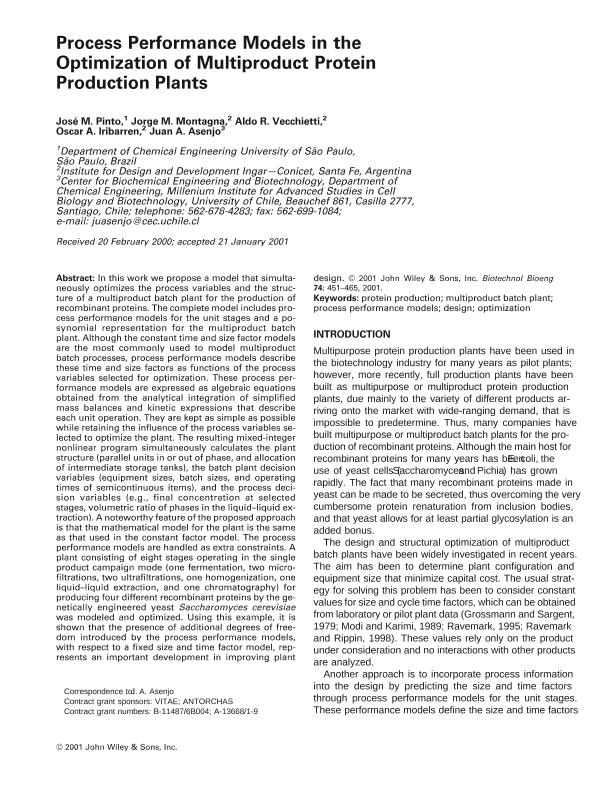Artículo
Process performance models in the optimization of multiproduct protein production plants
Pinto, Jose M.; Montagna, Jorge Marcelo ; Vecchietti, Aldo
; Vecchietti, Aldo ; Iribarren, Oscar Alberto
; Iribarren, Oscar Alberto ; Asenjo, Juan A.
; Asenjo, Juan A.
 ; Vecchietti, Aldo
; Vecchietti, Aldo ; Iribarren, Oscar Alberto
; Iribarren, Oscar Alberto ; Asenjo, Juan A.
; Asenjo, Juan A.
Fecha de publicación:
27/07/2001
Editorial:
John Wiley & Sons Inc
Revista:
Bioengineering And Biotechnology
ISSN:
0006-3592
e-ISSN:
1097-0290
Idioma:
Inglés
Tipo de recurso:
Artículo publicado
Clasificación temática:
Resumen
In this work we propose a model that simultaneously optimizes the process variables and the structure of a multiproduct batch plant for the production of recombinant proteins. The complete model includes process performance models for the unit stages and a posynomial representation for the multiproduct batch plant. Although the constant time and size factor models are the most commonly used to model multiproduct batch processes, process performance models describe these time and size factors as functions of the process variables selected for optimization. These process performance models are expressed as algebraic equations obtained from the analytical integration of simplified mass balances and kinetic expressions that describe each unit operation. They are kept as simple as possible while retaining the influence of the process variables selected to optimize the plant. The resulting mixed-integer nonlinear program simultaneously calculates the plant structure (parallel units in or out of phase, and allocation of intermediate storage tanks), the batch plant decision variables (equipment sizes, batch sizes, and operating times of semicontinuous items), and the process decision variables (e.g., final concentration at selected stages, volumetric ratio of phases in the liquid-liquid extraction). A noteworthy feature of the proposed approach is that the mathematical model for the plant is the same as that used in the constant factor model. The process performance models are handled as extra constraints. A plant consisting of eight stages operating in the single product campaign mode (one fermentation, two microfiltrations, two ultrafiltrations, one homogenization, one liquid-liquid extraction, and one chromatography) for producing four different recombinant proteins by the genetically engineered yeast Saccharomyces cerevisiae was modeled and optimized. Using this example, it is shown that the presence of additional degrees of freedom introduced by the process performance models, with respect to a fixed size and time factor model, represents an important development in improving plant design.
Archivos asociados
Licencia
Identificadores
Colecciones
Articulos(INGAR)
Articulos de INST.DE DESARROLLO Y DISEÑO (I)
Articulos de INST.DE DESARROLLO Y DISEÑO (I)
Citación
Pinto, Jose M.; Montagna, Jorge Marcelo; Vecchietti, Aldo; Iribarren, Oscar Alberto; Asenjo, Juan A.; Process performance models in the optimization of multiproduct protein production plants; John Wiley & Sons Inc; Bioengineering And Biotechnology; 74; 6; 27-7-2001; 451-465
Compartir
Altmétricas



